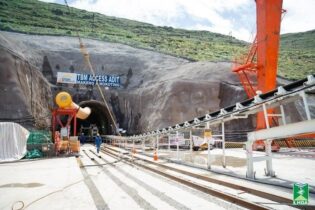One of the biggest threats to the future economic growth of South Africa is the shortage of technical skills in engineering and technology, Bryan Perrie, MD of The Concrete Institute, has warned.
Perrie believes the shortage of qualified concrete technologists, for example, is major component of the shortage of materials engineers in this country. “The fact that the training offered for many decades by the now defunct Cement & Concrete Institute (C&CI) is being continued by The Concrete Institute was clearly one of factors most welcomed by the building and construction sectors when the news of the formation of the new Institute was announced. It was as if the industries emitted a sigh of relief,” he states. John Roxburgh, of The Concrete Institute’s School of Concrete Technology (SCT), says the SCT continues to offer exactly the same courses as it did before. “I view the SCT along with the Information Centre as pockets of excellence and valuable South African assets that, if lost, could never be regained. Almost all of the top concrete technologists within this country have done studies at the school and research work in the Information Centre, producing concrete technologists that can stand with the best in the world.” Roxburgh says the SCT is a valuable brand, with students attending the different levels of courses receiving certificates on passing written tests. The universally known and very well respected ‘SCT brand’ leads to these certificates being instantly recognisable within the concrete industry and hence a valuable addition to any curriculum vitae.“The school offers a stepped approach to education in concrete technology. Depending on experience and previous education, a candidate can enter the education programme at a level suitable for his or her needs. A candidate with no previous exposure to concrete can enter at Level 1 courses, while a university graduate civil engineer can enter the programme at Level 2 or 3. Over time – and with some practical experience – a candidate can then embark on the more ambitious ICT (Institute of Concrete Technology) courses offered by the school, the pinnacle of these being the Advanced Concrete Technology (ACT) diploma course,” he adds.
The SCT will be offering the ACT diploma in a six-month-long programme running from January to July 2014. The students will attend 2 two-week long blocks of lectures in which industry experts are invited to lecture. This exposes the candidates to the most current concrete technology while at the same time giving them an excellent networking opportunity. “The SCT and Information Centre are key services offered by The Concrete Institute and there is a close synergy between the two. The school in part funds the Information Centre while the centre plays an essential function in updating the school with the latest available worldwide research and advancements in concrete technology. This, along with its rich history, positions the SCT to continue to its important role in alleviating the huge skills shortage in concrete-related industries,” Roxburgh states.





